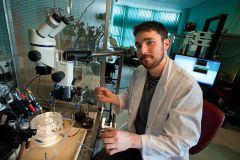Owen arrived at Otago in 2008 having taken a few years out after finishing his BSc. “I'm basically interested in how the brain works, so I was looking for a department where biological psychology had a strong presence.”
It wasn't hard to find - here at the University of Otago there are plenty of labs with a biological focus.
“There are researchers here looking at Alzheimer's disease, Parkinsons disease, schizophrenia and more. These are all devastating illnesses, so it feels good to be surrounded by people trying to solve these issues. Initially I was studying for a Postgraduate Diploma, but the research project I conducted as part of that course made me decide to sign up for a PhD. I'm now in my third year, and I can't really picture myself doing anything else.”
Owen's PhD involves looking into mechanisms that control plasticity, or change, at synapses - the connections between brain cells. This is a continuation of a project he conducted as a 400-level student in Professor Cliff Abraham's laboratory.
“I'm lucky to be in his lab. He's been a pretty big name in synaptic plasticity for some time now, and has put out some impressive publications. More than anything though, what drew me to this lab as a 4th year was how interesting the project seemed.”
“We store information in the brain by strengthening the synaptic connections between cells. However we need to stop them from becoming too strong as this can be damaging. Understanding how these processes are regulated could help us understand learning and memory, and might even help develop therapies to protect cells from damage. This kind of research, studying the activity of single cells or even single molecules, doesn't happen in many psychology departments, but it happens here at Otago”.
The nature of the work means he's had to become familiar with some pretty advanced neuroscience.
“I was a complete novice when I first came here, with virtually no lab experience. Luckily this hasn't been much of a hindrance, but it's definitely been a steep learning curve. Then again, getting to grips with new concepts and techniques is the best thing about doing a PhD, so I wouldn't have it any other way.”

Owen Jones
Department of Psychology